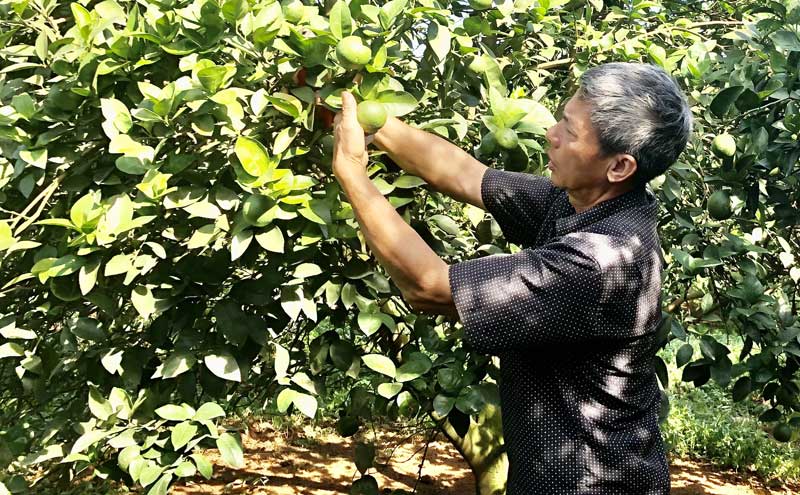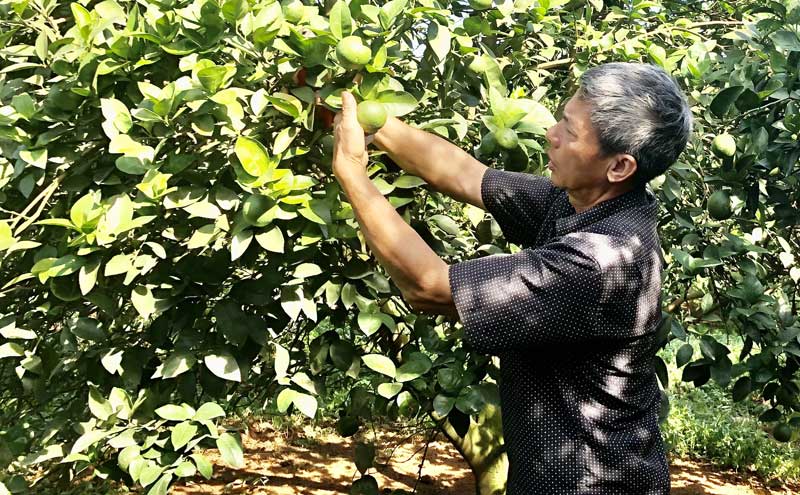
(HBO) – In the 2018-2020 period, the provincial Cooperative Alliance has launched two projects on building provincial-level value chains – one in the production and marketing of orange and longan, and another for safe vegetable with the involvement of five cooperatives. Total investment for the projects is over 5.55 billion VND (more than 238,756 USD), including more than 3.2 billion VND from the State budget.
 Manh Khoa Cooperative
in Cao Phong town of Cao Phong district has engaged in a project linking
production and selling of fruits in a chain value, which has shown high
economic efficiency.
Manh Khoa Cooperative
in Cao Phong town of Cao Phong district has engaged in a project linking
production and selling of fruits in a chain value, which has shown high
economic efficiency.
The projects have assisted the cooperatives in applying
cultivation technology under the VietGAP standards, as well as in securing
materials, using e-label for origin tracing and trade promotion.
As a result, the beneficiary cooperatives have been able to expand
production scale and increase productivity and product quality. The
cooperatives also saw increases of 3-5 percent in the number of members.
Connections under the value chain have helped reduce production cost for the
cooperatives by 5-7 percent, while pushing their productivity up by 12-15
percent, output by 16-18 percent, revenue by 15-20 percent, and profit by 10-12
percent.
The Cooperative Alliance in Hoa Binh has also helped the
cooperatives to sign selling contracts with a number of companies and
supermarket chains, including Vinmart, Lotte, T-max, and HPro Mart.
Along with the implementation of the two projects, the
alliance has given consultation and guidelines to many cooperatives in setting
up linkages in the production and selling of farm produce in line with the
Prime Minister’s Decision 62/2013/QD-TTg and the Government’s Decree
98/2018/ND-CP.
In the 2016-2020 period, the province has approved and
implemented 64 projects on building agricultural product value chains,
including 40 projects engaging local cooperatives, with total investment of
over 330 billion VND.
The province has coordinated with the Vietnam Cooperative
Alliance’s agencies to build three value chains for fish farming in the Hoa
Binh reservoir by Vay Nua agricultural cooperative in Da Bac district, Cao
Phong orange by Ha Phong cooperative in Cao Phong district, and lemongrass oil
by Dao village agricultural cooperative in Hoa Binh city./.
According to data from the Hoa Binh Provincial Party Committee, the industrial production index for the first six months of 2025 is estimated to have increased by 20% compared to the same period last year. This marks the highest year-on-year growth rate for this period since 2020.
In the first six months of 2025, Hoa Binh province’s export turnover was estimated at 1.145 billion USD, marking an 18.11% increase compared to the same period in 2024. Import turnover was estimated at $ 804 million, a 17.15% increase, which helped the province maintain a positive trade balance.
The lives of the ethnic minority farmers in Tan Lac district have gradually improved thanks to the new directions in agricultural production. This is a testament to the collective strength fostered through the professional associations and groups implemented by various levels of the district’s Farmers’ Union.
With the motto the "product quality comes first,” after nearly one year of establishment and operation, Muong village’s Clean Food Agricultural and Commercial Cooperative, located in Cau Hamlet, Hung Son Commune (Kim Boi district), has launched reputable, high-quality agricultural products to the market that are well-received by consumers. The products such as Muong village’s pork sausage, salt-cured chicken, and salt-cured pork hocks have gradually carved out a place in the market and they are on the path to obtaining the OCOP certification.
In the past, the phrase "bumper harvest, rock-bottom prices" was a familiar refrain for Vietnamese farmers engaged in fragmented, small-scale agriculture. But today, a new spirit is emerging across rural areas of Hoa Binh province - one of collaboration, organisation, and collective economic models that provide a stable foundation for production.
Maintaining growing area codes and packing facility codes in accordance with regulations is a mandatory requirement for agricultural products to be eligible for export. Recently, the Department of Agriculture and Environment of Hoa Binh province has intensified technical supervision of designated farming areas and packing facilities to safeguard the "green passport" that enables its products to access international markets.



 Manh Khoa Cooperative
in Cao Phong town of Cao Phong district has engaged in a project linking
production and selling of fruits in a chain value, which has shown high
economic efficiency.
Manh Khoa Cooperative
in Cao Phong town of Cao Phong district has engaged in a project linking
production and selling of fruits in a chain value, which has shown high
economic efficiency.